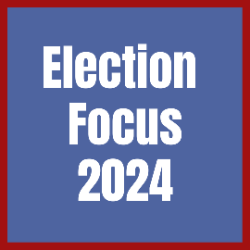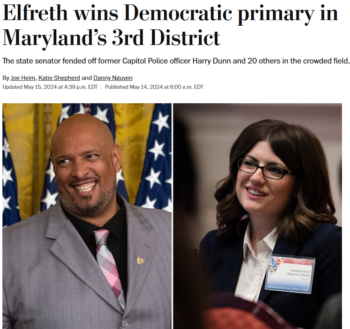 The biggest outside spender in the 2022 Democratic primaries was an unlikely group: the American Israel Public Affairs Committee. This year, AIPAC—a group backed by Republican mega-donors that is devoted to maintaining strong US support for the far-right government of Israel—is going even bigger, aiming to spend a cool $100 million via its super PAC, the United Democracy Project.
The biggest outside spender in the 2022 Democratic primaries was an unlikely group: the American Israel Public Affairs Committee. This year, AIPAC—a group backed by Republican mega-donors that is devoted to maintaining strong US support for the far-right government of Israel—is going even bigger, aiming to spend a cool $100 million via its super PAC, the United Democracy Project.
If the Koch brothers quietly spent millions to sway Democratic primaries, their chosen candidates would be tarred. Same goes for Big Oil, the NRA and other right-wing special interests. But AIPAC is an exception to this rule.
“AIPAC [is] the biggest source of Republican money flowing into competitive Democratic primaries this year,” Politico (6/9/24) reported. AIPAC’s UDP is “by far the biggest outside group in Democratic primaries, with more money flowing from UDP than the next 10 biggest spenders combined.”
Despite being conservative donors’ preferred instrument for hijacking Democratic primaries, UDP is described in media reports as “pro-Israel,” often with little said of its right-wing funding. This glaring omission provides AIPAC with cover to play in Democratic primaries in ways other right-wing groups can’t.
Money from right-wing billionaires

The Washington Post (5/14/24) waited until the 21st of 28 paragraphs to mention that Elfreth (right) had gotten $4.1 million in support from an AIPAC-affiliated super PAC—almost as much as rival Harry Dunn raised altogether.
I recently watched this play out in a nearby congressional district. On May 14, many Democratic primary voters went to the polls without knowing that a leading candidate for Maryland’s safely blue 3rd Congressional District, state Sen. Sarah Elfreth, was backed by right-wing billionaires via AIPAC’s super PAC.
Voters were kept in the dark thanks to deficient reporting. A Washington Post (5/14/24) story on election day, for example, waited until the 21st paragraph to mention that UDP had spent over $4 million on the race; then the Post quickly added: “United Democracy Project says it takes money from Republicans and Democrats.”
That last statement is technically true, and also deceiving.
While UDP’s funders hail from both parties, they share an elite status: Nearly 60% of them are CEOs and corporate honchos, In These Times (6/3/24) found. “But in no world could you even call this a bipartisan group of benefactors. It’s Republicans who know what they’re doing,” wrote Slate’s Alexander Sammon (2/7/24), in a story headlined, “There Sure Are a Lot of Republican Billionaires Funding the Democratic Primaries.” Sammon found that only one of the top ten donors to UDP “can even plausibly be called a regular Democratic booster.”
Among those Republican billionaires, as researched by the muckraking news outlet Sludge (3/4/24): Home Depot co-founder Bernie Marcus, who’s given UDP $3 million and donated around $65 million to Republican groups over the past decade, including $17 million to Trump super PACs; hedge fund manager Paul Singer, who’s given UDP $2 million and contributed millions more to Republican causes (and lavished gifts on Supreme Court Justice Samuel Alito); and WhatsApp founder Jan Koum, UDP’s top funder at $5 million this cycle, who’s bankrolled groups that support Israel’s illegal settlements.
Despite its heavy Republican funding, UDP spends almost exclusively in Democratic primaries. (UDP’s parent organization, AIPAC, has a less exclusive focus and backs many Republicans— including over 100 congressmembers who voted to overturn the 2020 election—through a separate political action committee.)
In the May 14 story, however, the Post never used its own authoritative voice to convey the above facts to readers—many of whom, as Democratic primary voters, would be alarmed to learn that right-wing donors were quietly backing a Democratic candidate. By playing dumb to Sarah Elfreth’s conservative support, the Post slyly helped her win.
‘What is broken with Washington’

The Washington Post (5/14/24) made Elfreth’s acceptance of “dark money” an accusation leveled by her opponent Harry Dunn (right)—and quoted another source saying Dunn complaining about it was “exactly what is broken with Washington.”
Of course, newspapers are supposed to be evenhanded, so the Post gave Elfreth’s opponent space to call out AIPAC’s millions—but even here, the coverage was slanted.
UDP’s massive spending “prompted the Dunn campaign to accuse Elfreth of taking ‘dark money’ and lumping her in with far-right Republicans,” the Post reported.
By having Harry Dunn—and not the Post itself—call out Elfreth’s Republican support, the Post turned an explosive issue into a mere allegation from a political opponent.
Then the Post went further, seeking to invalidate not only Dunn’s statement, but the candidate himself. (Dunn is a former Capitol Police officer who won national acclaim for fighting off January 6 insurrectionists.)
The Post wrote:
The Dunn campaign’s efforts to link Elfreth—an established Democrat—to Trump supporters rubbed some Maryland politicians the wrong way. “It just is exactly what is broken with Washington and not what will lead to a more productive US Congress,” said Maryland Senate President Bill Ferguson…[who] said the insinuation reflected Dunn’s inexperience in politics.”
Dark money
The Post story, while troubling, wasn’t exceptional. If anything, the Baltimore Banner’s coverage was worse.

The Baltimore Banner (5/12/24) dismissed criticism of Elfreth’s AIPAC help, saying that “criticizing an opponent’s money is nothing new.”
In the month leading up to the primary, UDP spent over $100,000 a day boosting Elfreth. This prompted other candidates to call out the influx of outside Republican money. But their protests elicited little more than a yawn from the Banner’s Rick Hutzell (5/12/24). “Criticizing an opponent’s money is nothing new,” he wrote.
Hutzell then took to lecturing Elfreth’s opponents, although not with much accuracy. “It’s not dark money,” he insisted. “UDP discloses its donors.”
At least Hutzell got the second part right.
“UDP is legally obligated to disclose its direct donors,” wrote HuffPost’s Daniel Marans (4/3/24), “but it may receive donations from corporations and nonprofits whose funders are not public.”
In other words, a donor who wished to provide Elfreth with anonymous support could’ve done so by having a non-disclosing entity, like AIPAC, forward their donation to UDP.
“If these MAGA donors funneled their money through AIPAC or any other nonprofit, then the individual donors would not be identified,” Craig Holman, a campaign finance expert with Public Citizen, told FAIR. “This is dark money in the truest sense of the word.”
‘Forever influence her worldviews’

The Guardian (5/14/22) suggested that AIPAC’s intervention in Maryland’s 3rd district House race might have been motivated to block labor lawyer John Morse, a minor candidate who made Gaza a central issue of his campaign—though the third-place candidate, state Sen. Clarence Lam, was also more critical of Israel than AIPAC would have been comfortable with.
Why AIPAC was involved in this race in the first place was a bit of a mystery, as the two leading candidates, Elfreth and Dunn, held seemingly indistinguishable views on Israel.
When asked about this, a UDP spokesperson (Guardian, 5/14/22) said there were “some serious anti-Israel candidates in this race, who are not Harry Dunn, and we need to make sure that they don’t make it to Congress.”
But UDP didn’t specify who was on its naughty list. Meanwhile, the race was already down to a two-way contest by the time UDP unleashed its millions, so all UDP was doing at that point was thwarting Dunn, who’s also pro-Israel.
Even Elfreth was confounded by UDP’s efforts, or so she claimed. Asked why the group was boosting her, Elfreth told the Banner, “I honest to God have no idea.”
No idea? Four months before announcing her candidacy, Elfreth took her first trip to Israel on what sounds like an AIPAC junket. She visited “a kibbutz that was [later] attacked by Hamas on October 7, an Iron Dome battery, a Hezbollah tunnel on the Lebanese border, the West Bank and religious sites,” Jewish Insider (4/3/24) reported.
In endorsing Elfreth, Pro-Israel America PAC, an AIPAC-adjacent group, wrote, “Sarah has traveled to Israel on a life-changing trip that will forever influence her worldviews.” The group quoted Elfreth as saying, “[I] walked away knowing that I believe—after millennia of the world turning its back on the Jewish people—that the State of Israel has the right to exist and to defend itself.”
Whether or not Elfreth was clueless about AIPAC’s support, one thing was clear: She was determined to keep its millions flowing her way. At an April debate with 16 hopefuls on stage, “moderators asked the candidates if they would swear off corporate PAC money,” Maryland Matters (4/18/24) reported. “Only Elfreth stayed seated.”
She was smart to do so, as AIPAC’s millions can prove decisive. They certainly did two years ago in a neighboring congressional district.
‘The ads started pouring in’

Intercept (7/20/22): Donna Edwards’ “past refusal to unconditionally support funding that enables Israel’s ongoing occupation and destruction of Palestinian communities was more than enough to draw the ire of the conservative pro-Israel donors who mobilized to defeat her.”
In 2022, Donna Edwards was poised to reclaim the House seat she’d vacated six years earlier. “Then the ads started pouring in,” the Intercept (7/20/22) reported:
[UDP] spent $6 million on television spots, mailers and other media…. Other pro-Israel organizations pitched in about $1 million more. The result was one of the most expensive congressional primaries in history, with nearly all of the money coming from outside the district over the course of only a few weeks.
Amid the $7 million onslaught, Edwards’ lead vanished. She lost the Democratic primary to prosecutor Glenn Ivey, who was quick to thank AIPAC after his win.
I keep thinking back to this election and wondering, what if reporters had called out AIPAC for hijacking this local race? At the very least, it would have made it harder for the group to get away with doing the same thing two years later, on behalf of Elfreth.
Collective amnesia
AIPAC’s continued ability to steal Democratic primaries rests on a collective amnesia setting in after each election. Unfortunately, reporters have proven willing to do their part to make this happen.
Last month, the moment Elfreth won, what little coverage there was of AIPAC lessened.
Take the May 14 Post story discussed above. While AIPAC appeared in its tenth paragraph, once Elfreth won, the story was rewritten, and AIPAC dropped down to the 21st paragraph.

AP‘s story (5/14/24) on Elfreth’s victory mentioned her “endorsements from the state’s teachers union and environmental groups”—but not AIPAC, which provided almost three-fourths of the money spent on behalf of her campaign.
That was better than an AP story (5/14/24) the Post ran, which didn’t mention AIPAC at all.
A Baltimore Sun (5/15/24) story belatedly noted AIPAC’s role, but only after portraying Elfreth as a victim of big money by comparing her to Angela Alsobrooks, a candidate who was up against the biggest self-funder in Senate primary history, liquor store magnate David Trone. “Not only were Elfreth and Alsobrooks…up against nationally known figures…they both also trailed their opponents in fundraising,” the Sun reported. This is only true if you don’t count the help UDP gave Elfreth; counting that money, which the Sun did later mention, she had a spending advantage of more than $1 million.
But once again, it was the Banner that took the cake. In Hutzell’s post-election story (5/17/24), Elfreth was the victim, having been forced to endure TV ads attacking “her over a pro-Israel super PAC spending millions to support her without her knowledge.”
It’s not until the 35th paragraph that Hutzell bothers to name AIPAC, and only in the context of how Elfreth is going to be, of all things, a champion for campaign finance reform.
She wants to pick up where US Rep. John Sarbanes, the man she hopes to succeed, left off on campaign finance reform. Elfreth makes this last pledge without irony, given the criticism she received for the more than $4.5 million that the American Israel Public Affairs Committee spent on her behalf.
With coverage like this, come 2026, AIPAC will be positioned to continue manipulating Democratic primaries by quietly weaponizing right-wing dollars.
‘Israel not a winning issue’

“UDP’s heavy reliance on right-wing (even hard-right) oligarchs comes into stark relief when looking at its most elite donors,” an In These Times analysis (6/3/24) found.
What’s so cynical is that UDP isn’t upfront about why it’s spending millions in Democratic primaries—at least not until after the election is over.
In explaining its support of Elfreth, UDP highlighted domestic issues, listing abortion rights, climate change and domestic violence—issues that are unlikely to matter much if at all to UDP’s Republican donors. The millions of dollars in ads UDP aired for Elfreth didn’t mention Israel; just like the group’s ads against Donna Edwards from two years earlier. “They know that Israel is not a winning issue,” said James Zogby (In These Times, 6/3/24).
But the moment the election was over, AIPAC declared that Elfreth’s win showed that it’s progressive “to stand with the Jewish state as it battles aggression from the Iranian regime and its terrorist proxies.”
In backing Elfreth, AIPAC’s right-wing donors knew exactly what they were doing. And so did Elfreth, notwithstanding her claims of ignorance. Reporters knew the score, too, even if their coverage didn’t reflect that. The only ones kept in the dark were voters.
This post was originally published on FAIR.